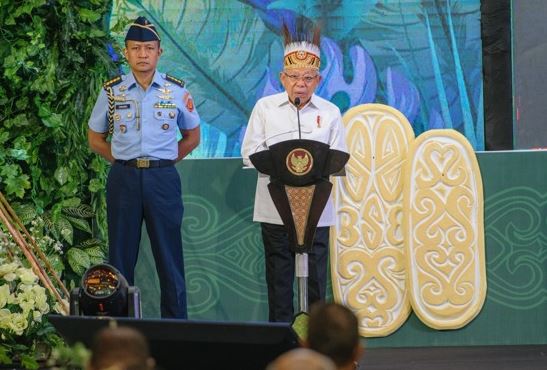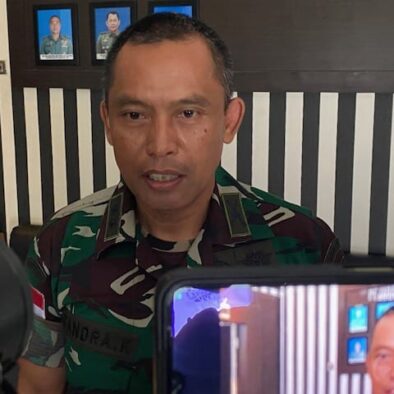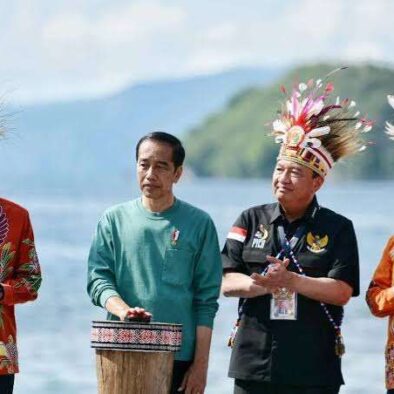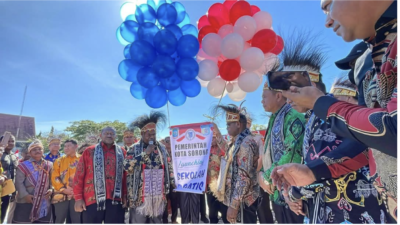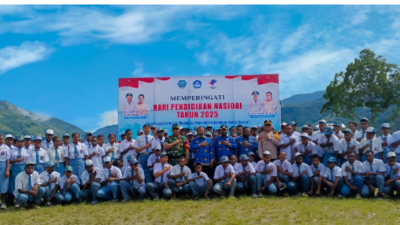Thelandofpapua.com – In a landmark move aimed at transforming Papua’s development landscape, the Indonesian government has unveiled the Master Plan for Accelerating Papua’s Development (RIPPP) for 2022-2041 and the Papua Development Acceleration Information System (SIPPP). Vice President Ma’ruf Amin emphasized the significance of this initiative, calling it a pivotal moment in Papua’s developmental history and a crucial determinant of its future progress.
“This is a significant moment that can be part of the history of Papua’s development and also a determinant for the future progress of Papua. Papua’s development has become a top priority, in line with the government’s commitment to achieving Indonesia-centric development to reduce regional disparities,” said Vice President Ma’ruf during the launch event in Sorong City, Southwest Papua.
The launch, organized by the Ministry of National Development Planning/Bappenas in collaboration with several other government bodies, including the Secretariat of the Vice President, the Ministry of Home Affairs, and the Ministry of Finance, received support from the SKALA Program, an Australia-Indonesia Partnership for accelerating basic services.
Vice President Ma’ruf Amin highlighted that the policies and strategies for Papua’s development aim to strengthen the role of new autonomous regional governments in enhancing the welfare of indigenous Papuans (OAP). One significant aspect of this effort is through regulatory strengthening.
Minister of National Development Planning and Head of Bappenas, Suharso Monoarfa, described RIPPP as a critical legal framework guiding the planning, budgeting, implementation, evaluation, and control of accelerated development in Papua. He remarked, “The launch of RIPPP 2022-2041 and SIPPP marks an important phase in Papua’s development. With these documents, we introduce the long-term development direction for the Papua region. We hope this becomes an important moment in promoting synchronization and harmonization of planning and budgeting, as well as collaboration between the central and regional governments and other development actors.”
Suharso elaborated that RIPPP embodies a new spirit and innovative breakthroughs necessary for accelerating development over the next 20 years. It aligns the goals and aspirations of Indonesia’s 1945 Constitution with the Vision Indonesia 2045 and the 2030 Sustainable Development Goals (SDGs).
Otto Ihalauw, a member of the Papua Special Autonomy Acceleration Steering Committee (BP3OKP) for Southwest Papua Province, stressed the importance of implementing and monitoring RIPPP. He acknowledged the skepticism among some community members, noting the challenges of aligning regional planning (musrembang) with local expectations and accurate budgeting.
One persistent challenge is regional disparity. Bappenas has prioritized this issue in the development strategies, aiming to enhance the welfare of Papuans. Yafeth Wetipo, a coffee entrepreneur from Papua, highlighted the lack of uniform operational standards for coffee farmers and the infrastructure challenges affecting access to potential plantations.
RIPPP addresses these issues by considering the aspirations and dynamics of forming four new Autonomous Regions (DOB), namely South Papua Province, Central Papua Province, Papua Highlands Province, and Southwest Papua Province. The creation of these regions aims to optimize public services, improve governance efficiency, and accelerate community welfare and equitable development.
The master plan outlines a vision of “Realizing an independent, just, and prosperous Papua” with thematic missions including Healthy Papua, Smart Papua, and Productive Papua. Achieving these goals requires strengthening access to basic infrastructure, improving environmental quality, and ensuring good development governance. It also emphasizes the importance of customary land, culture, and social harmony.
Furthermore, RIPPP integrates gender mainstreaming, socio-cultural considerations, digital transformation, and resilience to disasters and climate change into its development agenda. The plan is supported by the Papua Development Acceleration Action Plan (RAPPP), aligned with national mid-term development plans.
The government is currently drafting a Presidential Regulation on RAPPP 2025-2029, focusing on priority programs such as mobile health services, culture-based education, local economic development, and infrastructure enhancement.
RIPPP embodies a forward-thinking approach, aiming to make significant strides in Papua’s development over the next two decades. By focusing on the empowerment and competitiveness of Indigenous Papuans, it seeks to bring transformative changes across various aspects of life, locally, regionally, nationally, and internationally.

